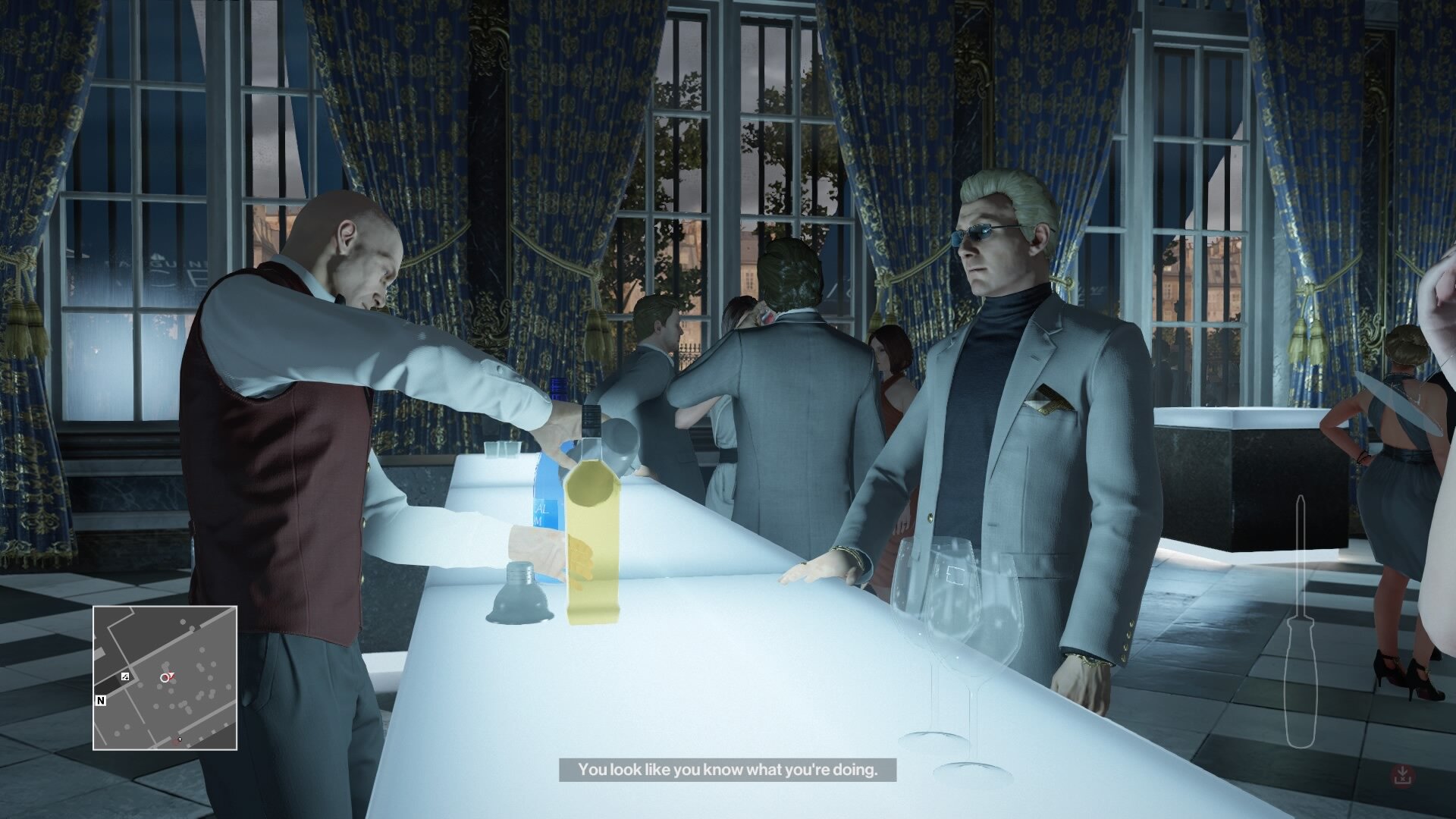Hitman (2016) review
Back in the PS2/GameCube era, I remember playing IO Interactive’s Hitman 2: The Silent Assassin and really liking it quite a bit. If I’m being honest, it was IOI’s other game, Freedom Fighters, which really captured my attention. But Hitman 2 was very good, and a stealth game to boot. And I love me some stealth games, let me tell ya!
Each level in Hitman goes something like this: Agent 47 sneaks in, probably acquiring a disguise along the way, collects some intel, and plans out how to dispatch his target discreetly, with as little collateral damage as possible. Along the way, a clever method of assassination may present itself; a way to kill this particular character that wouldn’t work with any other person. And Agent 47 will pull off this plan flawlessly, with a cold, unfeeling, robotic execution.
The ultimate goal in Hitman is to always kill somebody, of course—it’s right there in the name. And yet, somehow, it’s so much more than that.
Never trust a man who calls himself a “mixologist”.
For one thing, the game does not reward indiscriminate violence. While the player is attempting to assassinate a target, they are heavily incentivized to harm only the target. Each non-target kill carries a massive penalty into your final score, affecting your rating much more so than, for instance, whether you were spotted or not.
Then there’s the story, which while rather thin, does provide important background for understanding the game’s world. There’s the usual intrigue and spycraft we all know and love: international assassin networks, plutocratic secret societies, financial cabals controlling governments and corporations alike, genetically engineered super soldiers who inevitably go rogue. It’s all the greatest hits, and sets up the premise rather well.
This time around, Hitman presents an incredibly intricate sandbox of game elements and events to play around in.
Don’t forget to pick up a can of expired spaghetti sauce. It will come in handy, trust me.
A new optional system of Intel & Opportunities provides some much-needed guidance—along with optional waypoints—on how to go about assassinating your targets. These submissions, or side-acts, or whatever you’d like to call them, are quite numerous and add a ton of depth to each level. Any Hitman level will need to be played through multiple times to experience your various options, as following one path tends to close other possibilities. But it’s genuinely fun to plumb the depths of each assassination, and this results in there being seemingly hundreds of ways to play a single level.
Diving in, I was a little confused by certain intricacies of the controls. For example, some actions require you to hold a button down for a second or so, but other actions are activated with a simple button press. There’s been a few times where I’ve held down Triangle—because that’s what I’ve become accustomed to doing—instead of a quick tap of the button, and completely weirded out my next contact with suspicious behavior instead of just talking to them. I do understand why the developers included this “hold button to do thing” element to the controls; the player really needs to commit to performing certain actions, lest they make an extremely suspicious move on accident. But with dragging a body, for example, I really just want to do this as quickly as humanly possible, so holding down O to start dragging is a bit annoying.
Agent 47’s Instinct mechanic is excellent. At the touch of a button, time slows down a bit and the player’s view of the world is greatly simplified to basic wire-frames/silhouettes. Nearby people become visible through walls and other obstructions, your target is shown with a red silhouette, and—most importantly—any interactable objects in your vicinity are highlighted. This is incredibly helpful in differentiating important triggers and tools from static background details.
Agent 47 is hard Yoga Instructor, but fair.
All stealth games need something like the Instinct ability to make the game playable, even if it does technically imbue the player with superhuman powers of perception. Metal Gear Solid had its Soliton Radar System, Tenchu had its Ki Meter, Splinter Cell: Chaos Theory had both a light bar (showing how visible Sam was) and an aural monitor (showing how much noise Sam made). This is how to make stealth games work.
One thing I find very strange: whenever I launch Hitman on my PS4, it always seems to connect to “the Hitman servers”. This gives me the impression that the game always needs to be online. Does that mean if my internet goes out, I won’t be able to play? And if so, why? Perhaps the reason is that Hitman (2016) was originally released episodically, with each level released over time as a separate download. But considering how old the game is now, I’m wondering if an “always online” setup is sustainable for much longer.
Such exotic locales on offer here! A fashion show in Paris, a mansion on the Italian riviera, Marrakesh, Bangkok, and...uh...rural Colorado? (Huh?) But actually, the Colorado mission involves infiltrating a paramartiliary organization’s compound, which is pretty damn fun. I imagine the US domestic terrorism angle resonates so strongly here because it’s riffing on a very real—and unfortunately still timely—problem. Then the last level is set in the snowy mountains of Hokkaido, Japan, so that definitely won me over. (I lived in Hokkaido for a couple years back in the day, which you can read all about in my book, Shakotan Blue!)
This must be Mount Yōtei, also known as Makkari Nupuri, Mount Shiribeshi, and “Ezo Fuji”—Hokkaido’s Mt. Fuji. Stunning.
Despite the inherently violent nature of its premise, Hitman feel surprisingly benign in practice. Gameplay revolves around getting close to people, finding out what makes them tick, then using that knowledge of their character to cleverly take them out. Through skillful, stealthy play, you often get an inside view into the life of your target, and the lives of those around them. It's surprisingly compelling stuff, and I genuinely don’t think it’s the violence which actually makes it compelling.





